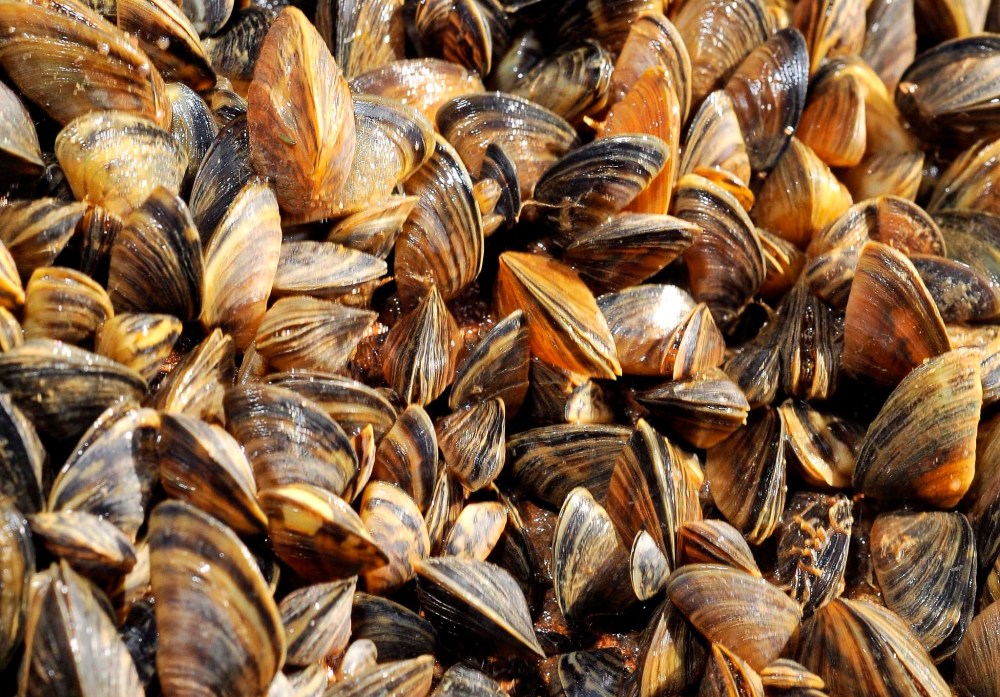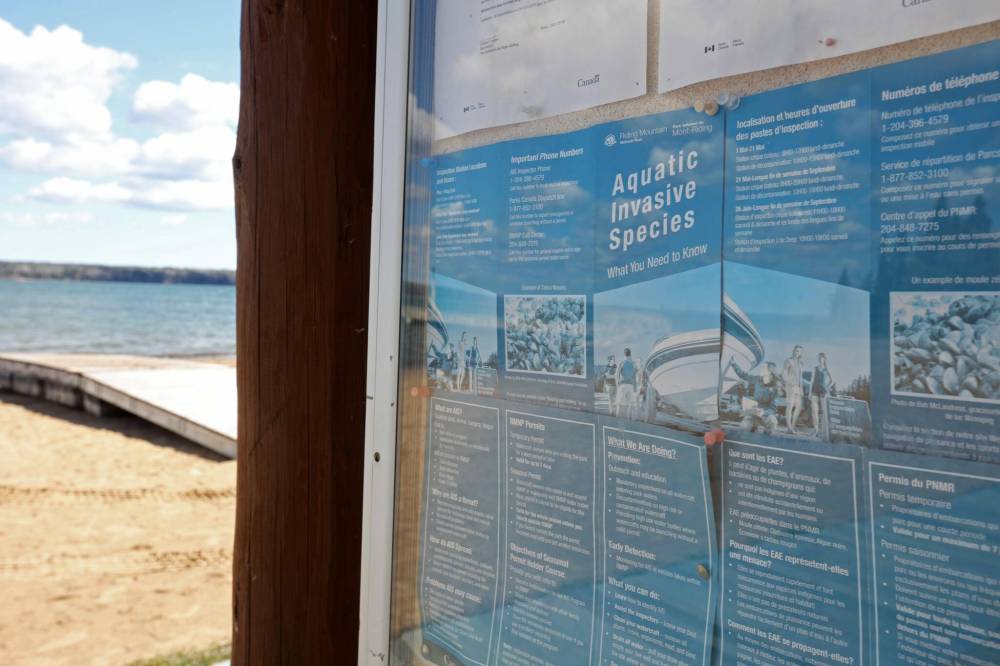March of the zebra mussels Sandy Lake group anticipates more boats after Clear Lake ban; calls for stricter rules to fight aquatic pests
Read this article for free:
or
Already have an account? Log in here »
To continue reading, please subscribe:
Monthly Digital Subscription
$0 for the first 4 weeks*
- Enjoy unlimited reading on winnipegfreepress.com
- Read the E-Edition, our digital replica newspaper
- Access News Break, our award-winning app
- Play interactive puzzles
*No charge for 4 weeks then price increases to the regular rate of $19.00 plus GST every four weeks. Offer available to new and qualified returning subscribers only. Cancel any time.
Monthly Digital Subscription
$4.75/week*
- Enjoy unlimited reading on winnipegfreepress.com
- Read the E-Edition, our digital replica newspaper
- Access News Break, our award-winning app
- Play interactive puzzles
*Billed as $19 plus GST every four weeks. Cancel any time.
To continue reading, please subscribe:
Add Free Press access to your Brandon Sun subscription for only an additional
$1 for the first 4 weeks*
*Your next subscription payment will increase by $1.00 and you will be charged $16.99 plus GST for four weeks. After four weeks, your payment will increase to $23.99 plus GST every four weeks.
Read unlimited articles for free today:
or
Already have an account? Log in here »
Hey there, time traveller!
This article was published 30/05/2024 (569 days ago), so information in it may no longer be current.
Daryl Kines started to get nervous when Parks Canada made the decision to ban boats on Clear Lake in Riding Mountain National Park this summer.
Kines is president of the Sandy Lake Water Protection Working Group, which focuses on protecting the small, L-shaped lake about 20 kilometres south of the park. He fears the ban, announced earlier this month, will lead to more boats on their lake.
“The march of aquatic invasive species is coming closer to where I live,” he said in an interview. “It’s very concerning.”
The boat ban, sparked by the discovery of live zebra mussels in Clear Lake last November, triggered widespread pushback — from area cottagers to the premier — who worry it will adversely impact the tourism-driven region. The discovery marks the most westerly presence of the invasive species in Canada, sparking calls for stronger mitigation efforts and enforcement to stop its spread.
Max Faulkner/Fort Worth Star-Telegram/MCT) 
Since 2018, the Sandy Lake group has run its own inspection station, examining about 1,500 boats between July and September and typically finding about five to 10 high-risk watercraft, Kines said. The group does not have the ability to decontaminate infested boats.
He has asked the province for independent or municipally-owned decontamination stations in underserved areas and strict rules for high-risk boats.
Riding Mountain MLA Greg Nesbitt, the Progressive Conservative environment critic, has called for the province to open new inspection stations and test water bodies downstream of Clear Lake.
Earlier this spring, the Manitoba government boosted its budget by $500,000 to tackle aquatic invasive species, which will go to expanding the inspection program to nine stations this year.
TIM SMITH / BRANDON SUN FILES Pamphlets about aquatic invasive species are posted along the Clear Lake beach.
“We know that the spread of zebra mussels can happen quickly, and that’s why we want to increase our support for preventing the spread of zebra mussels across Manitoba,” Economic Development, Investment, Trade and Natural Resources Minister Jamie Moses said in an interview.
Manitoba’s zebra mussel monitoring program started in 2011. Back then, a team of two summer students checked boats at high-traffic border crossings on weekends.
We know that the spread of zebra mussels can happen quickly, and that’s why we want to increase our support for preventing the spread of zebra mussels across Manitoba.”–Minister Jamie Moses
When zebra mussels were detected in the basin of Lake Winnipeg in 2013, the province progressively escalated its efforts. New laws in 2015 allowed enforcement officers to issue tickets to boaters; the following year, the province nearly doubled the budget for the invasive species program to $1 million, with most earmarked for six inspection stations.
As mussels and other invasive species continued to spread, the province implemented what it dubbed “control zones” where the aquatic pests are already established or are expected to pop up soon. Any boat that has been in a control zone must be decontaminated before moving elsewhere.
Today, zebra mussels have invaded nine major waterways in Manitoba, stretching from the Red River in the south to the Hudson Bay in the north while taking hold in two of the province’s largest lakes and becoming an ongoing headache at hydroelectric stations along the Nelson River.
Last year, the province inspected more than 8,200 boats (down from a peak of more than 20,000 inspections in 2020), decontaminated more than 1,300 and issued 72 warnings and 26 charges for rule violations.
The province also added two inspection stations last year near Minnedosa and Ste. Rose du Lac, on the west side of the province, in hopes of catching more infested boats.
Inspection stations are a key tool in Western Canada’s defence against the fingernail-sized shellfish that costs the country $7 billion in prevention, control and management every year.
There are mandatory boat inspection and decontamination stations on the Manitoba-Saskatchewan border, and more throughout Alberta and British Columbia.
In B.C., any boat launched in Manitoba waters in the past 30 days is considered high risk. In Alberta and B.C., roving inspectors set up checkpoints on high-traffic highways; some are equipped with canines trained to sniff out evidence of aquatic invasives.
Across North America, preventing the spread of aquatic invasive species has so far relied on regulations and public education campaigns that encourage boaters to clean, drain, dry and sometimes decontaminate their watercraft.
The only way zebra mussels move from waterway to waterway is with human help, mostly by stowing away on boats, trailers and other equipment.
Alongside education, many provinces have introduced enforcement in the form of boat inspections and fines.
Ontario, which is widely mussel-infested, doesn’t have mandatory checkpoints, but introduced laws in 2022, including fines up to $350, mandating boaters clean and dry their equipment before launching in new waters. In 2018, Manitoba introduced a fine list including a $672 penalty for failing to attend an inspection station.
To Kines, Manitoba’s aquatic invasive species team deserves credit: he said they’re knowledgeable and want to enact some of the suggestions he and other lake groups have put forward.
He worries their hands are tied. They may want to take action, he said, “but their budgets are such that they can’t.”
julia-simone.rutgers@freepress.mb.ca

Julia-Simone Rutgers is the Manitoba environment reporter for the Free Press and The Narwhal. She joined the Free Press in 2020, after completing a journalism degree at the University of King’s College in Halifax, and took on the environment beat in 2022. Read more about Julia-Simone.
Julia-Simone’s role is part of a partnership with The Narwhal, funded by the Winnipeg Foundation. Every piece of reporting Julia-Simone produces is reviewed by an editing team before it is posted online or published in print — part of the Free Press‘s tradition, since 1872, of producing reliable independent journalism. Read more about Free Press’s history and mandate, and learn how our newsroom operates.
Our newsroom depends on a growing audience of readers to power our journalism. If you are not a paid reader, please consider becoming a subscriber.
Our newsroom depends on its audience of readers to power our journalism. Thank you for your support.











